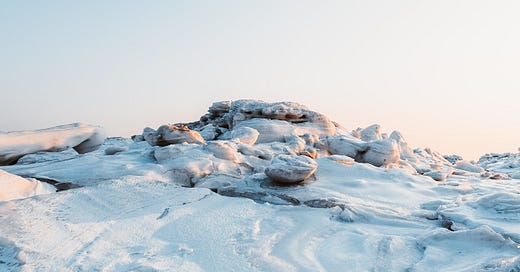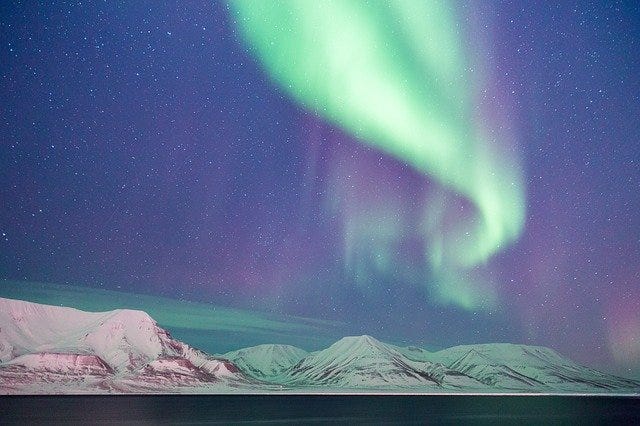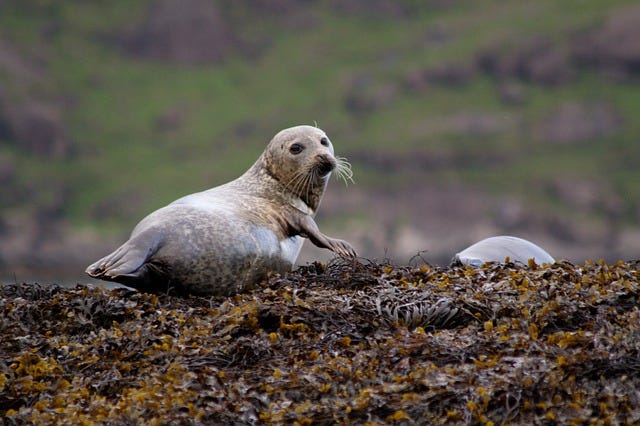The Hanged Man: Part 4: Yule
Post #30: In which love and friendship allow ...
(If you are a new subscriber, you might want to start at the beginning of The Hanged Man. If you prefer to read Part 4 in its entirety, go here. For the next serial post, go here.)
Eurydice sighed. She wiped tears from her cheeks. “I didn’t want to die. I didn’t want to stop loving him. I know what I once felt was real. I just…needed to leave and I couldn’t go back. I could only go forward.”
“I understand,” said Mary quietly. “I understand. You did nothing wrong, Eurydice. You couldn’t help it. What happened to him, do you know?”
“Oh yes. He drifted for a time with his grief. He refused comfort or companionship. He wandered the barren, lonely places and played only desolation. He withheld music that healed and loved. He withheld joy. And he died.”
Mary shook her head. “He couldn’t accept.”
“No. He’d never been thwarted before, you see. The power of his music overcame every obstacle. When it failed him, I suppose he gave up.”
“So, you came here?”
“Yes. I came to Janus house. Hel said whatever I needed was here and I need not strive or seek or try but just be with whatever comes. But I feel…lost. I can’t get back to that peaceful place I found when I sat before the door, no matter how quiet I am. I wish I could meet myself here — myself from some future time -- a wiser self who would comfort me and show me the way.”
Mary felt as though she’d been doused with a bucket of cold water. She gasped and let go of Eurydice’s hand, putting her own hand to her chest.
“What?” asked Eurydice in alarm. “What is it?”
“I’ve…just realized something,” said Mary slowly.
“Are you all right?”
“Yes.”
From some way off Molly’s laugh rose, clear and infectious, delighted. Both women smiled in response. Mary laughed too. “How amazing,” she said simply, but didn’t try to explain.
“So, Eurydice,” she said, turning back to the young woman, “you’re searching for yourself here?”
“Sometimes I think maybe there’s nothing to find.” Eurydice lowered her eyes and sifted through the stones on the beach with her hand. “Sometimes I’m afraid I’m not anything but the reflection in someone else’s eyes.” Her voice broke.
Mary took her in her arms and let her weep, caressing the dark fall of hair, rocking, feeling Eurydice’s tears wet her sweater. The young woman smelled of sun-soaked dusty leaves, a little bitter. Gradually, her crying wore out and she pulled away, wiping her face and sniffling. Mary handed her the end of her scarf. “Use this.”
“But my nose!”
“Blow!” commanded Mary. “The stupid thing will wash!”
Eurydice laughed shakily and blew her nose.
“We all begin as the reflection in someone’s eyes, Eurydice. It takes time to make friends with yourself.”
She rose and zipped up the collar of her coat. “Now, where’s that pesky child? I want a snack and a hot drink. Will you come back with us?”
Eurydice stood too, tucking her hair into the collar of her coat and settling her hat more firmly on her head. She stood shorter than Mary, and was generously built. “The child, is she yours?”
Mary considered for a moment. She smiled. “Yes,” she said, “she’s mine.”
The two women set out in the direction Molly had gone, following the sound of her laughter. They came out of a tumble of large rocks where stony beach sloped down to water. Slabs of ice lay piled together.
A kayak was pulled up on the shingle and Molly crouched next to an adolescent boy with a wing of black hair falling over his eyes. As they approached, he stood. He looked thickset and strong, but his face retained some childish roundness. He brushed hair out of his eyes, smiling at them.
Molly ran to Mary with a handful of carvings. She held out a fox made out of greenish grey stone and two white geese of ivory or bone.
“Look!”
Mary admired them.
“This is Kunik. He carved those, and he told me a story about them. He came in his kayak.”
“Kunik,” repeated Mary, in greeting. “I’m Mary, and this is Eurydice. Are you alone?”
“Yes,” he said briefly, and Mary sensed a polite but firm withdrawal from that particular subject.
“We’re staying in a guest house here,” said Eurydice. She gestured up the bluff toward Janus House. She held the carvings in her broad palm, examining them with delight. “These are wonderful. Did you bring more?”
“Yes. I’m always making them. Sometimes I see…shapes inside material.”
“What else do you do?” asked Molly curiously.
“I can drum — a little. And I like stories.”
“Oh, we do, too! I know some good stories. If we tell you one, will you tell us one?” She pushed her honey-colored riot of curls out of her face impatiently. Kunik eyed her with something like amazement, and Mary wondered how long he’d lived alone.
Molly grinned at him. “Please?” she coaxed. We can go up in the rocks and sit out of the breeze.”
She was irresistible. He smiled, capitulating.
***
Somewhat to Mary’s surprise, Molly told Kunik about the night of transformation at the bonfire. It made a good story, and Molly had noticed more detail than Mary realized. Both Eurydice and Kunik were caught by the strange tale. He’d brought a drum out from the interior of the kayak, as though intending to play, but it sat idle in front of him as he listened, too caught up to think of anything else.
When Molly finished, they sat quietly for a few minutes. Mary, listening to the wash of the tide, heard again the chorus of voices murmuring “Rest now. Rest now. Rest now.” That was the place for the drum, she thought, an unobtrusive but integral heartbeat.
“Now you,” said Molly to Kunik.
Kunik inclined his head gravely. “There are stories in the world like pebbles on a shore,” he said. “Some are so old they belong to all people, but some are born out of one person’s life. These are sacred gifts, pieces of personal magic. You’ve given me such a gift. May I tell it to others?”
Molly glanced at Mary, who smiled back at her.
“I guess,” said Molly uncertainly. “If you think anyone would like it.”
“I think everyone will like it,” he said seriously. “In return for this gift, I’ll give you a new story, born out of my life. I’ve never told it before.”
“In a land where snow drifts like fallen stars and night sky ripples with color, a baby was left on the ice. Spirits of the baby’s ancestors looked down from the night sky, holding torches of green, orange, red, pink and violet. They caused the ice to break and the baby floated, guided by the spirits, to another place.
People found the baby and preserved his life, but they mistrusted him, so he slept with the dogs and shared their food of bones and walrus hide.
When the baby become a boy, there came a time when the hunting and fishing were poor, and the people blamed the boy for bringing them bad luck. They sent him out at night as food for the polar bears, hoping the sacrifice would restore the balance necessary for life.
The boy crouched on the ice, waiting for death. Three bears paced around him, sniffing and growling, their long claws digging into the ice. After circling for a time, the bears left, though the boy was helpless and made no effort to fight them.
The boy knew he couldn’t go back to the village. He stole a kayak and paddled away, out into the world, leaving behind the land where snow drifts like fallen stars and night sky ripples with color.”
Kunik began to beat the drum in a gentle, slow rhythm and the listeners imagined the boy, paddling away from the ice into the dark sea alone. He moved farther and farther away, drumbeat of oar slower and quieter, until he floated out of sight.
Molly sighed. Her cheeks were wet and she took off her mitten and wiped them with her hand. Kunik watched her.
“That was a good story,” she said to him. “I wonder why the bears didn’t eat the boy?”
He smiled, and it warmed his whole face.
***
They walked down to the inlet nearly every day to see Kunik. He fished, explored in his kayak, and seemed perfectly self-sufficient and happy, but Mary thought he looked forward to seeing them, talking, sharing food and stories.
Mary, Eurydice and even Molly refrained from questioning Kunik about his history after the first story he’d told them. There was an unspoken agreement to leave such a painful past in peace, but Mary’s generous nature grieved for him and she wanted to know more of the story. What happened to his parents? Why had the people acted so cruelly? Why didn’t the polar bears eat him? Had he been adrift in the world in his kayak since then? He wasn’t very old.
Eurydice confessed to Mary the picture of a baby, wrapped in a sealskin, floating alone on a raft of ice between cold black sea and shimmering sky haunted her. Kunik told them about the northern lights, waves and sheets of color rippling in the long nights, whispering. Mary could see Eurydice was fascinated by the young man, and Molly treated him like a brother.
“Tell another selchie story,” said Molly one cold afternoon.
They were sitting around a small fire, transparent in daylight but radiating welcome warmth in a sheltered spot between rocks.
Kunik laughed at Molly. “Aren’t you bored with the selchie yet?” He had told them several tales of the legendary selchie, creatures who were human upon the land and seals in the sea. Molly was never tired of hearing about them.
“No,” she said seriously. “Tell about the man who stole the selchie’s skin and begged her to marry him because he was so lonely. And then years and years later the selchie starts to die because she can’t go back to the sea without her skin. And then one of her children finds it and she swims away and doesn’t die, after all, but she has to leave her children.”
“Do you think she was wrong to do that, Molly?” Mary asked curiously.
“I don’t,” said Eurydice. “She couldn’t give up what she was. She didn’t ask him to do that.”
“He broke his promise to return her skin after seven years,” said Molly. “That was wrong.”
“He feared she’d leave him if she found it — and she did,” Kunik pointed out.
“But if he’d given it back to her freely, she might have stayed with him part of the time,” said Eurydice, “if she could trust him.”
“If she’d gone back after finding her skin, do you think he would have stolen it again?” asked Kunik. “I’ve always wondered.”
“It’s not fair to be forced to choose between your own life and your children,” said Mary heatedly. “No one should have to do that. He was cruel.”
“Yes. But she understood from his point of view she was the cruel one,” said Kunik.
“You knew her?” asked Eurydice in surprise.
“I met her. Her name was Selena. She was lovely. Her son is a man now, a shaman, because he can go under the sea and live with the seals as well as live on land.”
“Did she ever go back to the fisherman?” asked Mary.
“No. She couldn’t trust him. She always felt bad about it, though. She didn’t want him to be lonely and she didn’t want to hurt him. But she needed to be who she was. She said real love, true love, requires that we allow.”
“Allow what?” asked Eurydice.
“Allow those we love to be.”
“To be what?”
“To be everything they are.”
Eurydice released her knees and straightened her back, folding her legs to sit cross legged. She wriggled on the hard rocks, trying to find a more comfortable position. She picked up a stone and laid it on a larger one embedded in the shingle. “A selchie.” She picked up another and laid it alongside the first. “A wife.” She set a third stone beside the first two. “A mother.”
“But there might be so much more,” said Mary. “Maybe we’re more than we can ever discover in one lifetime. Maybe all the pebbles on this beach lined up are still not enough for all the selves you and I and everyone might be.”
“And real love allows all that?”
“Real love doesn’t just allow it,” said Kunik. “Selena said real love invites growth and change, seeking and finding. She said most people speak of love but practice limitation.”
Eurydice considered this. She stacked the three pebbles, added others to build a miniature wall, laid out stone spirals and designs.
“I think eventually we must discover what we’re made of — or we die,” said Kunik.
“Maybe sometimes that means making terrible choices,” said Mary.
“I met someone who gave up everything for a man,” said Eurydice. “In the end, she killed herself because he intended to take the only things she had left — their children. Love is confusing, isn’t it? I thought it meant giving everything I am, caring more about another than myself. Isn’t that what everyone says?” She looked up at Kunik. “But you’re talking about something different. You make love sound brave and enduring, like a mountain, instead of soft and romantic, like an overripe fig.”
She laughed at Kunik’s expression. “Figs are fruit that grows on trees. They’re soft and sticky, about the size of this stone.” She held up a small rock.
“Ah,” he said, his puzzled expression clearing.
“Is giving up everything you are to love someone else romantic?” asked Molly. “I thought romance meant being loved for who you are. If you give up who you are, how can you truly be loved?”
“Exactly,” said Kunik. “That’s why Selena said real love allows.”
EURYDICE
That night, after a long soaking bath and her evening meal, Eurydice dreamt.
She sat in front of the door in Hades. The door stood absolutely flat and featureless, just as she remembered, except a gold key with jeweled scrollwork was inserted into an invisible keyhole. She felt happy and peaceful. She was absolutely certain she could sit for as long as she wanted. There would be no interruption. There was nothing else she needed to do. As she relaxed into the certainty of infinite time to do what she most wanted, the door began to open. Slowly, it swung away from her and light shone over the threshold into the dim grey shadows of Hades. The light strengthened and Eurydice could smell green and growing things. She heard no sound. The door swung wider and wider and a whole crowd of people stood there. She looked into the crowd. She saw Mary and Molly, hand in hand. She thought she glimpsed Hel, way in the back, but then lost sight of her. She saw strange faces and half remembered faces. Then she saw her own face, smiling back at her. Next to that woman stood another with the same face. Suddenly, everywhere she looked her own face mingled with the others. Each version of herself dressed differently and some faces looked older and some younger, but they smiled at her with love and tenderness. Some versions of herself were holding snakes twining around their arms. Some were holding children, always boys with thick, dark hair and olive skin who smiled at her with shining dark eyes. In complete silence, every face turned towards her, smiling with such warmth and love tears came to her eyes. She thought they were happy the door was opened, and she tried to say, “But I didn’t open it! I didn’t do it! It opened by itself!” but no sound came out of her mouth and into her mind another voice spoke, a voice she didn’t hear with her ears but in the great silence of the dream that was like the silence of her own mind, “Choose, Doorkeeper…”
A woman stood in front of her, hooded and cloaked, holding a torch in one hand. At her feet sat a wolf. It looked her full in the face with topaz eyes. Behind the shrouded figure Eurydice saw darkness, spangled with silver galaxies. The hooded woman reached forward and put an object in Eurydice’s hand. The torch and the wolf’s eyes were the same color, blurring and shimmering against blackness out of which silver rain wheeled. Silver and gold mingled, dazzling, fading into gleaming metallic puddles, draining away…
The dream began to fade. Eurydice willed herself to stay asleep. She wanted to ask a question, an important question. She must ask! But the dream faded in a swirl of color and light. She felt blankets and sheets against her skin, the pillow under her cheek, the weight of one leg folded over the other, warmth in the hollow of the feather bed she lay in, a strand of hair over her shoulder, and she awoke.
“What…?” she thought drowsily. “What…?” But the question faded with the dream and she no longer knew what it was.
She turned over and slid back into sleep, the fingers of one hand folded over a gold key with scrollwork at the top, set with gems like drops of blood.
(This post was published with this essay.)





